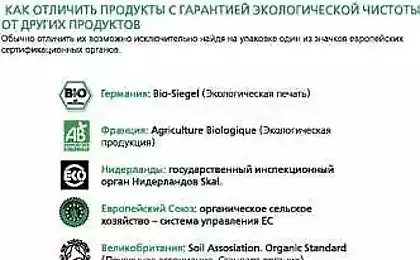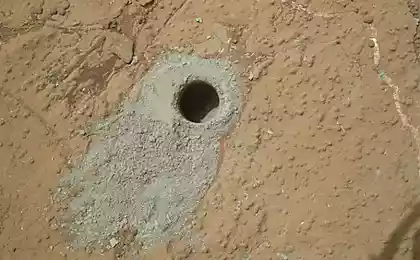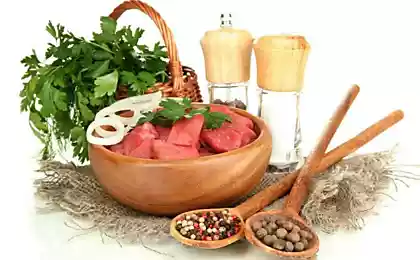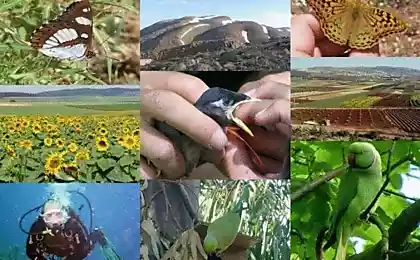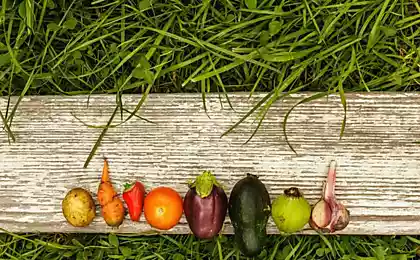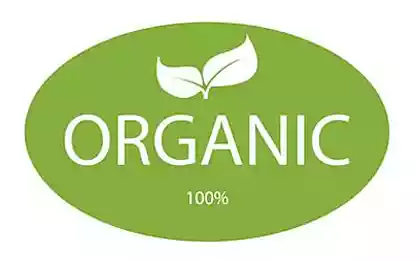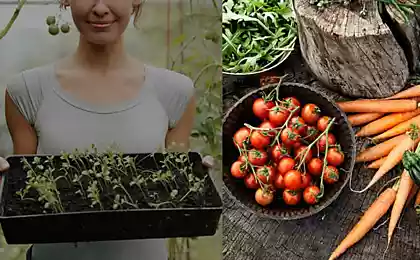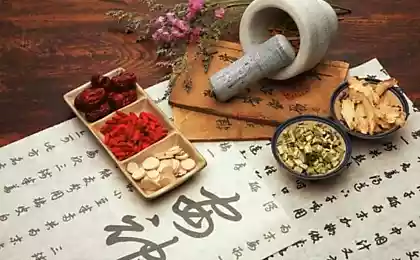442
That's what your "organic products"! Have understand the chemistry of a man boiling
Sixty six million eight hundred twenty three thousand seven hundred fifty one
The term "organic" in relation to food grown "without nitrates" seems to be firmly entrenched in language and in life. But does he really even make any sense? The website publishes authoritative opinion, by which is impossible. Many rational comments!
About the problems of "organic" food.
Long wanted to write about it, but kept putting it off. Understand that little to write about "organic" food, you have to do, so as not to offend anyone.
So, I'll try to not write a very angry text. But a very detailed and thorough.
Me, as a person who studied biology and chemistry (both organic chemistry and inorganic), at school, and then at the Technion (the famous technological University in Israel — approx. ed.), confess, cringe (in the literal sense of the word!), when I hear phrase like "organic tomatoes" or "organic eggs".
I will try to explain not too boring.
Organic substances are substances containing in its composition carbon C (with a few exceptions), and often chains of several carbons. For example, polyethylene (polymer consisting of long carbon chains) is an organic substance and water (consisting of oxygen atom and two hydrogen atoms) is an inorganic substance.
So when the store I offer organic potatoes, I really want to ask them inorganic.
You say, what difference how to name? Answer — great! Why would anyone in his speech, to use words or phrases, the meaning and significance of which he does not understand? It's ridiculous! It's like saying "aluminum, zinc and other types of iron." It's forgivable in the Humanities (he is all forgivable!), but a normal person it makes you shudder and convulsively clench his fists!
Will object — but I want people to use the term "organic" in their, comfortable to them the value — have the right!
For example. Let's say you agreed that zinc, copper, lead, tin — it's all the same such here are different kinds of iron. No, damn it, do not say, but screw you! Forget it!
What is the difference, in the opinion of the adherents of organic food, organic cucumber from inorganic? And then it is usually a explanation: organic cucumbers grown "without the use of chemicals". Implying, of course, that raised him to bypass the laws of nature (without the use of chemicals!), and the fact that they used natural fertilizers, i.e. manure. And for growing an inorganic cucumbers — will explain the adepts, is known to use nitrates.
I hasten to disappoint fans of the "organic food". Your organic vegetables and fruits, from the special shops, also grown on nitrate. Because the membrane of the root of the plant allows only certain chemical molecules. The root does not absorb, sorry, cow d***mo and the plant eats them. The root absorbs from the soil water and dissolved nitrates (source of nitrogen), phosphate (source of phosphorus) and Potassium cations — these chemicals (nitrate, phosphate and potassium) are the main component of power plants and all of these substances are inorganic.
In short, no matter what you fertilize the soil ready the nitrate or manure, the plant eats nitrate.
Manure in the soil first undergoes the process of mineralization to ammonia, and then, under the action of certain bacteria, undergoes nitrification to nitrate. And these molecules of nitrate absorbed by the roots.
Nitrates! You know? 2 shekels you paid for the carrots or 20 — it still has grown on nitrate.
Is there any difference in the nitrates derived from the s**t, and nitrate, obtained from a package of chemical fertilizers? Answer: no. Nitrate is an ion, a compound of one atom of nitrogen and three atoms of oxygen. The formula had one.Is never "good" nitrates and "bad."
Can I use nitrates to harm the plant? You can! You can get poisoned everything. The only question is the concentration. If the concentration is incorrect, it can poison the plant and, as a consequence, human.
So maybe the use of manure protects plant from "overdose"? No! No way! Moreover, the manure poison the plant is much easier than the ready-made chemical fertilizers. And not only that with the manure recorded various pathogenic microorganisms and viruses (manure — a source of infection). In addition, it is very difficult to calculate the required amount of manure in the soil. To do it "by eye" will not work, as the receipt of the nitrate comes in three slozhnosostavnyh process:
1st process — the mineralization of obtaining ammonia. The process depends on the composition and level of soil acidity, the amount of rainfall and temperature (varies from season to season, from year to year, etc.). Ie if in the last year from 100 grams of manure you got X grams of ammonia on your site, this does not mean that by putting this year's 100 grams to the square, you will get the same X grams of ammonia.
Further nitrification occurs in two stages:
First obtained in the 1st process X grams of ammonia under the action of the bacteria must be transformed into Y grams of nitrite.
And then Y grams of nitrite (if the soil enough oxygen, i.e. aerobic conditions) must be converted to Z grams of nitrate.
The problem is that nitrite is a very toxic substance! Much more toxic than nitrate. And he, unfortunately, is also absorbed by membrane of root cells. I.e. nitrite penetrates into the plant and through it in our blood. Nitrite poisoning causes what kind of anemia (AFAIK).
Now, fortunately, the nitrite in the soil is very unstable and it requires specific conditions. But still to poison them.
So:
I'm not talking about insertion of manure into the soil pathogenic microbes and viruses.
But if in the soil making ready synthesized fertilizer for calculating the correct dose of nitrate agronomist or a farmer you simply need to have some basic knowledge. Making ready the nitrate, it is easy and simple to control the whole process. If only he's not stupid and not a jerk.
Therefore, the usefulness or harmfulness of vegetables depends mainly on the degree of literacy and education grower! It's not what I said. We're so explained Professor Technion AVI Shaviv known and a great expert on the chemistry of the soil!
Literacy and education! Think before you pay more for "organic cucumber" whether the author of these cucumbers have these qualities. Think twice! Do not be afraid of chemicals, fear of obscurantism.
via www.facebook.com/permalink.php?story_fbid=1133841846681016&id=100001656330292
The term "organic" in relation to food grown "without nitrates" seems to be firmly entrenched in language and in life. But does he really even make any sense? The website publishes authoritative opinion, by which is impossible. Many rational comments!
About the problems of "organic" food.
Long wanted to write about it, but kept putting it off. Understand that little to write about "organic" food, you have to do, so as not to offend anyone.
So, I'll try to not write a very angry text. But a very detailed and thorough.
Me, as a person who studied biology and chemistry (both organic chemistry and inorganic), at school, and then at the Technion (the famous technological University in Israel — approx. ed.), confess, cringe (in the literal sense of the word!), when I hear phrase like "organic tomatoes" or "organic eggs".
I will try to explain not too boring.
Organic substances are substances containing in its composition carbon C (with a few exceptions), and often chains of several carbons. For example, polyethylene (polymer consisting of long carbon chains) is an organic substance and water (consisting of oxygen atom and two hydrogen atoms) is an inorganic substance.
So when the store I offer organic potatoes, I really want to ask them inorganic.
You say, what difference how to name? Answer — great! Why would anyone in his speech, to use words or phrases, the meaning and significance of which he does not understand? It's ridiculous! It's like saying "aluminum, zinc and other types of iron." It's forgivable in the Humanities (he is all forgivable!), but a normal person it makes you shudder and convulsively clench his fists!
Will object — but I want people to use the term "organic" in their, comfortable to them the value — have the right!
For example. Let's say you agreed that zinc, copper, lead, tin — it's all the same such here are different kinds of iron. No, damn it, do not say, but screw you! Forget it!
What is the difference, in the opinion of the adherents of organic food, organic cucumber from inorganic? And then it is usually a explanation: organic cucumbers grown "without the use of chemicals". Implying, of course, that raised him to bypass the laws of nature (without the use of chemicals!), and the fact that they used natural fertilizers, i.e. manure. And for growing an inorganic cucumbers — will explain the adepts, is known to use nitrates.
I hasten to disappoint fans of the "organic food". Your organic vegetables and fruits, from the special shops, also grown on nitrate. Because the membrane of the root of the plant allows only certain chemical molecules. The root does not absorb, sorry, cow d***mo and the plant eats them. The root absorbs from the soil water and dissolved nitrates (source of nitrogen), phosphate (source of phosphorus) and Potassium cations — these chemicals (nitrate, phosphate and potassium) are the main component of power plants and all of these substances are inorganic.
In short, no matter what you fertilize the soil ready the nitrate or manure, the plant eats nitrate.
Manure in the soil first undergoes the process of mineralization to ammonia, and then, under the action of certain bacteria, undergoes nitrification to nitrate. And these molecules of nitrate absorbed by the roots.
Nitrates! You know? 2 shekels you paid for the carrots or 20 — it still has grown on nitrate.
Is there any difference in the nitrates derived from the s**t, and nitrate, obtained from a package of chemical fertilizers? Answer: no. Nitrate is an ion, a compound of one atom of nitrogen and three atoms of oxygen. The formula had one.Is never "good" nitrates and "bad."
Can I use nitrates to harm the plant? You can! You can get poisoned everything. The only question is the concentration. If the concentration is incorrect, it can poison the plant and, as a consequence, human.
So maybe the use of manure protects plant from "overdose"? No! No way! Moreover, the manure poison the plant is much easier than the ready-made chemical fertilizers. And not only that with the manure recorded various pathogenic microorganisms and viruses (manure — a source of infection). In addition, it is very difficult to calculate the required amount of manure in the soil. To do it "by eye" will not work, as the receipt of the nitrate comes in three slozhnosostavnyh process:
1st process — the mineralization of obtaining ammonia. The process depends on the composition and level of soil acidity, the amount of rainfall and temperature (varies from season to season, from year to year, etc.). Ie if in the last year from 100 grams of manure you got X grams of ammonia on your site, this does not mean that by putting this year's 100 grams to the square, you will get the same X grams of ammonia.
Further nitrification occurs in two stages:
First obtained in the 1st process X grams of ammonia under the action of the bacteria must be transformed into Y grams of nitrite.
And then Y grams of nitrite (if the soil enough oxygen, i.e. aerobic conditions) must be converted to Z grams of nitrate.
The problem is that nitrite is a very toxic substance! Much more toxic than nitrate. And he, unfortunately, is also absorbed by membrane of root cells. I.e. nitrite penetrates into the plant and through it in our blood. Nitrite poisoning causes what kind of anemia (AFAIK).
Now, fortunately, the nitrite in the soil is very unstable and it requires specific conditions. But still to poison them.
So:
- Mineralization gives us inaccurately predicted X amount of ammonia.
- The first stage of nitrification gives us even more trudnoprohodim Y nitrite, depending on the number X and the degree of aerobic soils.
- The next stage of nitrification gives even more trudnoprohodim Z the amount of nitrate-specific and Y the number of nitrite-dependent X amount of ammonia and the conditions in the soil.
I'm not talking about insertion of manure into the soil pathogenic microbes and viruses.
But if in the soil making ready synthesized fertilizer for calculating the correct dose of nitrate agronomist or a farmer you simply need to have some basic knowledge. Making ready the nitrate, it is easy and simple to control the whole process. If only he's not stupid and not a jerk.
Therefore, the usefulness or harmfulness of vegetables depends mainly on the degree of literacy and education grower! It's not what I said. We're so explained Professor Technion AVI Shaviv known and a great expert on the chemistry of the soil!
Literacy and education! Think before you pay more for "organic cucumber" whether the author of these cucumbers have these qualities. Think twice! Do not be afraid of chemicals, fear of obscurantism.
via www.facebook.com/permalink.php?story_fbid=1133841846681016&id=100001656330292
As I Troll the trolls. History, over which you will cry from laughter!
I did the repair. Someone funny and who not!


